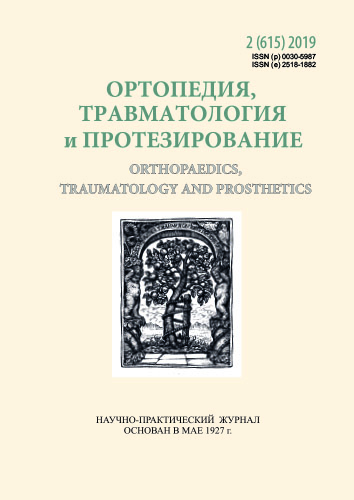Physiological aid for children with osteogenesis imperfecta
DOI:
https://doi.org/10.15674/0030-59872019282-86Keywords:
osteogenesis imperfect, psychopathological manifestations, psychological adaptation, socializationAbstract
Last decade there is growth of interest to the problem of children with combined physiological disorders and musculoskeletal system, like osteogenesis imperfecta (OI).
Objective: to assess the complex physiological aid to patients with OI aged 4 months to 60 years and its influence on the treatment efficacy.
Methods: we examined 40 patients with OI aged 4 months to 60 years old. We used Thomas questionaries, tests projects «Non existing animal», Lusher colored test, Kettells test. Diagnosis of interpersonal relations was carried out according to T. Leary’s methodology. Studied the opinion of the subject about himself and the idea of what others see it (Q-sorting). For the study of quality of life (QL) a questionnaire was created according to the tasks of the orthopedic and traumatological clinic and the index of QL (IQL) was calculated.
Results: patients with OI belong to the risk group of development of psychopathological manifestations, neurotic disorders due to the relaxation of the barrier of psychological adaptation. Their IQL was (–5.6 ± 0.3) scores, it indicated a low social status. Mental tension on the eve of surgery and in the first week of treatment is indicated by all patients. This is a consequence of the stress-reaction with all its characteristic components: braking in the cortex, excitation in the subcortical formations, dysfunction of the endocrine glands, and changes in homeostasis at all levels. Depression is a general reaction of the body to the long-term effects of severe chronic stress. A psychological correction course of 10 exercises has been developed, which includes muscle relaxation, visualkinesthetic dissociation, techniques of positive imagination. After the course of psychocorrection, patients noted improvement in emotional state, reduction or disappearance of anxiety symptoms, significant improvement in psychological status and QL.
Conclusions: comprehensive psychological support and psychocorrection of patients with OI contribute to improved treatment outcomes and, consequently, better positive motivation and full socialization.
References
- Kholmogorova A. B., & Garanian, N. G. (2006). Psychological assistance to people who survived traumatic stress. Moscow: MGPPU.
- Kvasenko, A. V., & Zubarev, Yu. G. (1980). Psychology of the patient. Leningrad: Medicine. (in Russian)
- Tarabry, N. V. (2000). Clinical Psychology. Sankt-Petersburg: Peter. (in Russian)
- Mamaychuk, I. I., & Vorobieva, O. V. (1984). Psychological study of the personality characteristics of children with diseases of the musculoskeletal system. Rehabilitation treatment of children with diseases of the musculoskeletal system. L.: Enlightenment. (in Russian)
- Mamaychuk, I. I. (1995). Mental development of an anomalous child. Sankt-Petersburg. (in Russian)
- Mikhailov, B. V., Serdyuk, A. I., & Chugunov, V. V. (2014). Experimental-psychological research in general practice of family medicine: Educational device. Kharkiv: KhMAPO. (in Ukrainian)
- Briare, J. & Scott, K. (2015). Fundamentals of Traumatic Psychotherapy. (in Ukrainian)
- Bendler, R. (1985). Use your brain to change. Yuventa. (in Russian)
- Chaban, O., Pinchuk, I., Khaustova, E., Bero, M., Moskalenko-Mospanenko, E., Oleynik, A., &Frankova, I. (2016). Survive a shock: help with stress and post-stress disorders. Kiev. (in Russian)
Downloads
How to Cite
Issue
Section
License
Copyright (c) 2019 Andrey Pashenko, Tatyana Yatsenko, Sergey Khmyzov

This work is licensed under a Creative Commons Attribution 4.0 International License.
The authors retain the right of authorship of their manuscript and pass the journal the right of the first publication of this article, which automatically become available from the date of publication under the terms of Creative Commons Attribution License, which allows others to freely distribute the published manuscript with mandatory linking to authors of the original research and the first publication of this one in this journal.
Authors have the right to enter into a separate supplemental agreement on the additional non-exclusive distribution of manuscript in the form in which it was published by the journal (i.e. to put work in electronic storage of an institution or publish as a part of the book) while maintaining the reference to the first publication of the manuscript in this journal.
The editorial policy of the journal allows authors and encourages manuscript accommodation online (i.e. in storage of an institution or on the personal websites) as before submission of the manuscript to the editorial office, and during its editorial processing because it contributes to productive scientific discussion and positively affects the efficiency and dynamics of the published manuscript citation (see The Effect of Open Access).














